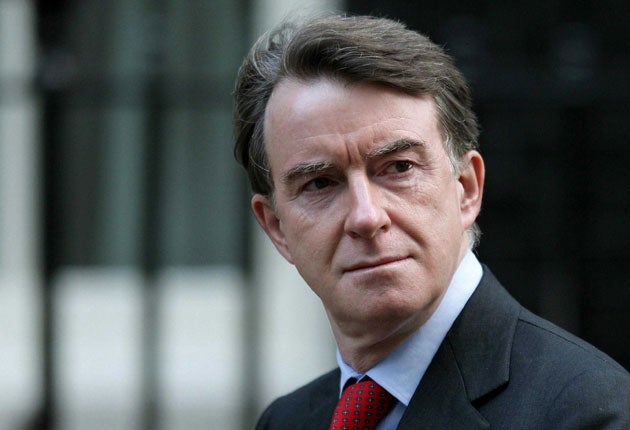Peter Mandelson: ‘It’s simply a myth that Labour can win from the left’
The Labour former cabinet minister told students at King’s College London that he hoped Keir Starmer would give the British people their winning party back


Peter Mandelson was the special guest this week at the last class of this year’s “Blair Years” course that I teach at King’s College London with Michelle Clement and Jon Davis. He offered a bracing defence of New Labour, arguing that the party has to learn the lesson of its three election victories – that it can only win from the centre.
We asked him if he thought “New Labour” would always be seen negatively by party members, and he started by disputing the assumption behind the question. “The fact is that the broad swathe of the party’s membership – I don’t mean in the immediate Corbyn period – but mainstream normal party members actually like winning, they like winning elections and therefore they think positively about New Labour,” he said.
“I would like to think that, through the party’s successive election losses since, New Labour is now increasingly looking very attractive. As we view the records of successive Tory governments, our record is looking better. And as we see the performance of prime ministers since Tony Blair, you could look back and see Blair as an attractive fusion of good values, high competence and strong vision for the country.
“That is likely to emerge further, in time – at least I hope so, obviously – but I think it would be better to reframe the question as follows: Why is the most successful electoral period in Labour’s entire history something that many in the party repudiate rather than want to emulate?”

Having changed the question to his liking, he went on to answer it: “The Labour Party tends to be a small ‘c’ conservative party, resistant to change. I am of course exaggerating to make a point, but only slightly,” he said. “The Labour Party has never been good at learning the lessons from its numerous defeats. It is even worse at learning the lessons of its rare victories. It is a pretty fundamental observation.
“Only the Labour Party could watch Ed Miliband be trounced in the polls and conclude that the answer to that defeat is Jeremy Corbyn. Only the Labour Party could do that.”
He contrasted the response to defeat in 2015 with how Blair and Gordon Brown, MPs from 1983, and he, as Labour director of communications from 1985, dealt with losing: “We did actually analyse and draw some difficult conclusions about our defeats at Thatcher’s hands. And the conclusion that we reached was that there were elements of Thatcher’s settlement that were irreversible. Not because we were neoliberals, but because some of these changes were necessary. Trade union reform, privatisation of old nationalised industries, and a change from the corporatism that had clearly failed by the end of the 1970s.”
He traced the origins of New Labour right back to one of the most creative periods in the party’s history: “the thinking that went into the development of Labour’s manifesto in 1945, led by Hugh Dalton and my own grandfather” (Herbert Morrison, Mandelson’s mother’s father, was deputy prime minister in the postwar Labour government). That was a period of “revisionism” that is all too rare in the Labour Party, Mandelson said, in contrast with the Conservatives: “Unlike Labour, they are completely hung up on power and winning; they’re prepared to rethink, they’re prepared to do previously unimaginable things, because they know that, electorally, they have to respond to the public, modernise, and keep up with the times.”
The next attempt to modernise social democracy had been in the 1960s, he said, when Harold Wilson and Barbara Castle published a white paper, In Place of Strife, which recognised that “trade unions needed to operate within a framework of law”. That was sabotaged by James Callaghan but he later became a “revisionist” himself as prime minister, for example on education standards and council house sales.
And he, too, then came up against Labour’s small “c” conservative tendency, said Mandelson: “Following the takeover of Labour’s policymaking by the Bennite left in the early 1970s – the biggest, most reactionary conservative force ever unleashed in the history of the Labour Party: Bennery – Callaghan was blocked by the sclerotic, left-dominated National Executive Committee of the party. So I’m not saying that revisionism is completely alien to the Labour Party. It did exist before New Labour, but my God it was difficult to grasp the nettle, and to get anything to a point where it might prevail.”
Eventually, however, it did prevail under the leadership of Blair: “In the 1990s he overwhelmed his opposition by argument, he created a real tide, running and flowing in his favour. He defeated the left, intellectually.” But it didn’t last. “While in the Nineties there was a high tide of revisionism and we were in the intellectual ascendancy, creating a sort of force majeure in the party to go along with what we were trying to create, we didn’t sustain it. The intellectual ascendancy didn’t last. Hence New Labour went out of fashion, and the negative associations grew. And the question is: why, given the evident major reforms and successes of the government, didn’t we sustain it? Big question. At its heart, in my view, were the TB-GBs,” he said, referring to the relationship between Blair and Brown.
One of the students asked Lord Mandelson what he made of Ed Balls’s argument that the “creative tension” between Blair and Brown made for good government. “There was creative tension, especially in the early period of their partnership; they were two intellectual giants, amazing to be with,” said Mandelson, “But later it was 90 per cent tension and 10 per cent creative.” He said their relationship became “destructive”, and that the conflict between them began the process of undermining New Labour.
Read more:
He said: “At the heart of this narrative were the genuine differences about quite a number of things, but mainly public service reform, between Tony and Gordon. It was this fissure that fuelled the divide and contributed so much to the delegitimisation of New Labour in the party. Neither of them wanted or intended this. I don’t believe for one moment that Gordon actively planned ahead and said, ‘Right, I’ve got to undermine trust in Tony and I’ve got to move to the left on public services, and I’ve got to appeal to the party’s rank and file by contrasting myself with Tony at New Labour’s expense.’ Did Gordon think consciously that he intended to delegitimise New Labour? No. But he did want to become leader of the Labour Party, which is not a crime, and do whatever it took to replace Tony to achieve that goal.”
Indeed, as prime minister, Brown created his own version of New Labour and made peace with it, even bringing Mandelson back to government as business secretary and first secretary of state. But in Mandelson’s view, significant damage had been done, and the response to losing the election in 2010 was the crucial moment: “The defeat of David Miliband by Ed Miliband was then an absolutely pivotal moment in the breeding and fostering of the negative associations that you’re talking about.
“The party in the country actually chose David over Ed. Labour MPs chose David over Ed. Of course, as you know, the unions, essentially Unite, swung it for Ed. If David had won, the New Labour legacy would have been left intact and built on and adapted. It would have changed; it would have evolved; it would have been rethought and reapplied to new challenges. The revisionism would have, in other words, continued. Instead, it was explicitly rejected by Ed and the process of delegitimising New Labour, begun under Gordon, was then given decisive impetus by Ed.
“Ed saw it as his political mission, and still does, to reinject traditional ‘socialist values’ as he saw them, and to validate the sort of ideological outlook he learnt at his father’s knee. For him, New Labour was an intrusion, a sort of imposition, and therefore a betrayal, even though, ironically, he had played his own part in the Treasury’s own apostasy. I mean the single parent benefit fiasco in our first year; the Treasury’s imposition of PFI on the public sector; the advocacy of Alan Greenspan-ian market freedoms in financial services. This was apostasy with which Ed was complicit. But of course all that has been expunged.
“New Labour had few allies amongst the intelligentsia, and was weakened for this reason. Although Blair stimulated support for the New Labour cause amongst party members, this was as much for his election-winning capability as for his famously policy-educative speeches delivered at successive party conferences. The great teacher, as I used to call him. But amongst party members, they weren’t really thinking intellectually in a revisionist sense, they were thinking more, ‘This is brilliant; let’s keep on winning.’”

So when the party stopped winning, it drew the wrong conclusions, according to Mandelson. He accepted that there were faults on both sides of the Blair-Brown divide. “The new Clause IV should have been the moment of permanent cultural change,” he said, referring to Blair’s rewriting of the party’s constitution in 1995, when the aim of “the common ownership of the means of production” was removed.
“But the New Labour positioning, which was the alliance of a dynamic economy with aspiration and the cause of social justice, started to evaporate when Blair departed the stage,” Mandelson said. “We hadn’t put down the roots, I’m afraid, to change the culture of the party. It became an aberration, rather than the birth of a new progressive century, to which we hoped New Labour would be the midwife.
“And that’s our fault, no doubt. Iraq is a factor, undoubtedly, but it goes deeper than that. Because we were revisionists who believed in separating the ends from the means: timeless Labour values realised through modern means. And because we were so focused on means as the things we had to change, we forgot to talk enough about the idealistic ends. We overdosed a bit on reassurance.”
There were good reasons for that at the time: “Believe me, as I grew to understand from 1985 onwards, it’s actually hard, very hard, for Labour to win an election outright, and therefore that reassurance is needed for the public: that we will be prudent, that we will be sensible, that we will be balanced, that we will stand up for aspiration and not just the most vulnerable.
“I’m afraid it’s simply a myth that Labour can win from the left. It’s what many in the party cling to despite all the evidence to the contrary, but we have to win from the centre, and then pursue as progressive an agenda in government as we possibly can.”
Read more:
The idea that Labour “can and should be a left party winning from the left, offering true socialism” was what won Ed Miliband the leadership from his brother. “It reached its apotheosis in the 2017 election, when Corbyn claimed – just as Tony Benn had claimed that 8 million people voted for socialism in 1983 – that 40 per cent of the public were suddenly converted to the far left’s view. In fact, 2017 of course was a Brexit election. It was like a rerun of the referendum the year before, when the Leave half of the country lined up solidly with the Tories, and indeed increased the Tories’ vote share, and the Remain vote quit the Lib Dems and swung around behind Labour, raising our vote share too. That’s what that was about. It wasn’t a vote for socialism. It was actually a vote for Remain.”
One of the students asked if the coronavirus crisis was an opportunity for Labour, because public opinion now supported the government spending more to stimulate the economy. Mandelson was sceptical: “Up to a point, yes, but one of the possible advantages that Boris Johnson and the Tories seem to have created is that they are high spending from the right, and not high spending from the left. I just raise it as a question, I’m not offering it to you as a proposition, I’m raising it as a question. We are seeing it elsewhere in Europe – the public reaching out to more left policies but looking to right-wing politicians to deliver them. Will the Labour Party ever be able to win back trust on tax and spend – for the public to put the same faith in the left’s high-borrowing, high-spending and higher-taxing programme of the sort that you say, rightly, they’ve now adjusted to?
“‘Going big’ with Labour is undoubtedly exciting to many, but will be frightening to others. Big spending, big ambition, big goals, big state have become more attractive, and part of me sympathises and agrees that one of the problems we have in this country, certainly for example when it comes to industrial policy and strategy, is that even when we have the right ideas, they’re not scaled properly. To make the real difference you have to make an impact and that impact has to be created by scale, so I have an industrially activist sympathy myself for ‘big’ and scale.
“I just think that a Labour hunger for the big state and big spending and big taxation will be viewed by the public as, ‘Oh God, here they go again, it’s the old Labour Party back, put them in charge and before you know where we are, you’ll have spending and taxes shooting through the roof, market chaos and rising interest rates, all the old miseries will come back.’ I’m not saying that’s what would happen, but I am afraid that there’s often an old statist ring to Labour’s language, and an aggression that the public finds worrying.
“They will find it worrying, and I’m afraid it will reinforce my view that Labour is better to win elections from the centre and pursue a thoroughgoing progressive agenda that we have prefigured in the election. The fact is that there are not enough people, not enough voters, on the left, or indeed in inner cities and university towns, to elect us. There aren’t enough of them. So to be elected as a majority government, we have to take the centre ground and voters in other towns and traditional communities with us as well. These are respectful, progressive voters, but sometimes more socially conservative – or, to put it another way, not oriented to identity politics as some metropolitan-minded people are.
“We have to be a coalition – not speaking to one slice of the electorate – a national party or we are nothing. Without this electoral coalition, the centre ground and the left, in the north and Scotland as well as the south, we’re not electable. Period.”
However, Mandelson was optimistic about Labour’s future, and praised Keir Starmer’s leadership. My colleague Jon Davis reminded him that Neil Kinnock said, “We’ve got our party back,” when Ed Miliband became leader.
“I know. It was terrible. Absolutely terrible. We know exactly what he meant by that, don’t we, that old Labour had got their party back. I would say in contrast that I hope to God that Keir is successful, so that the British people can get their Labour Party back – one capable of winning.”

Join our commenting forum
Join thought-provoking conversations, follow other Independent readers and see their replies